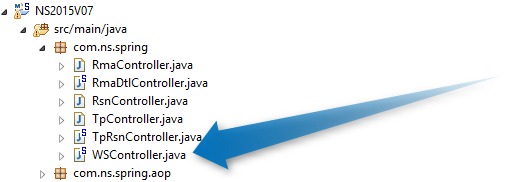REST client:
1 2 3 4 5 6 7 8 9 10 11 12 13 14 15 16 17 18 19 20 21 22 23 24 25 26 27 28 29 30 31 32 33 | import org.apache.commons.lang3.StringUtils;import org.springframework.http.HttpEntity;import org.springframework.http.HttpHeaders;import org.springframework.http.HttpMethod;import org.springframework.http.MediaType;import org.springframework.http.converter.json.MappingJackson2HttpMessageConverter;import org.springframework.web.client.RestTemplate;import com.ns.model.UdsTransactionRequest;import com.ns.model.UfsReferenceNumber;import com.ns.model.notification.UfsPipeline;import com.ns.service.ServiceResponse; @SuppressWarnings("unchecked") private void testGet2() { RestTemplate restTemplate = new RestTemplate(); Long txId = 123456789L; String[] array = {"6B","EL","SO","RN","KK"}; ServiceResponse<UfsReferenceNumber> response = restTemplate.getForObject(url, ServiceResponse.class, txId, StringUtils.join(array, ",")); List<UfsReferenceNumber> results = response.getData(); if (results != null && !results.isEmpty()) { for (UfsReferenceNumber a : results) { System.out.println("---------------- ID: " + a.getId().getRefNum()); } } System.out.println("---------------- END testGet2------------------"); } |
This gives the URL:
1 | http://localhost:8080/transaction/references/pipeline/123456789/?types=6B,EL,SO,RN,KK |
The “request.getParameter(“types”);” gets the values from URL “types=6B,EL,SO,RN,KK”.
REST endpoint:
1 2 3 4 5 6 7 8 9 10 11 12 13 14 15 16 17 18 | @RequestMapping(value = "/references/pipeline/{txId}/", method = RequestMethod.GET)public ServiceResponse<UfsReferenceNumber> getReferences(@PathVariable String txId, HttpServletRequest request) { ServiceResponse<UfsReferenceNumber> response = new ServiceResponse<>(); String typesCsv = request.getParameter("types"); List<String> types = null; List<UfsReferenceNumber> references = null; if (null != typesCsv && 0 != typesCsv.length()) { types = Arrays.asList(typesCsv.split(",")); } try { references = repo.getTxnReferenceNumbers(new Long(txId), types); if (null != references && !references.isEmpty()) { response.setData(references); } } catch (Exception e) { } return response;} |






